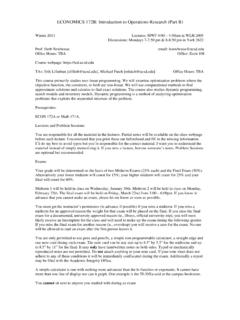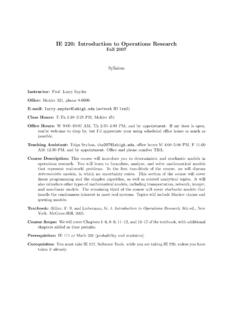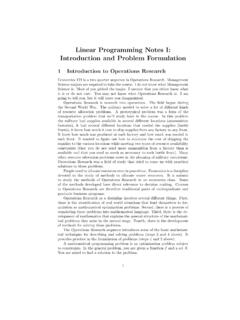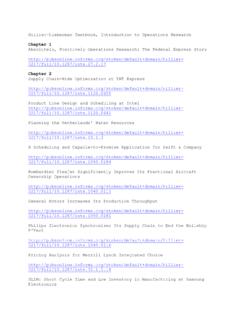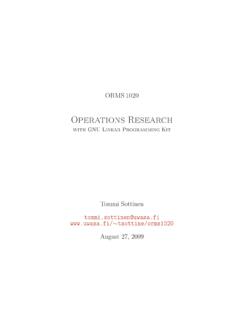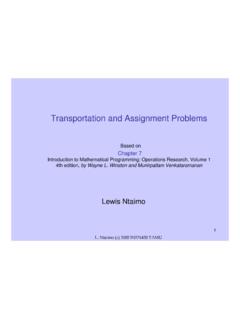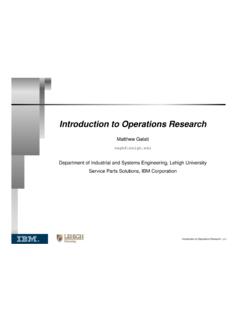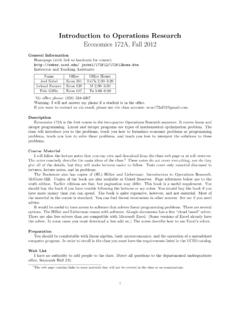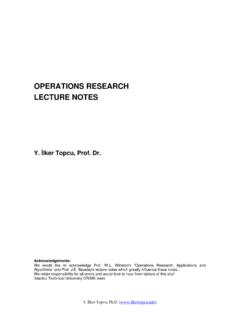Transcription of ECONOMICS 172A: Introduction to Operations …
1 ECONOMICS 172A: Introduction to Operations research (Part A) Fall 2017 Lectures: MWF 12:00 12:50 pm in GH 242 Discussions: Wed 6:00-6:50 pm & 7:00-7:50 pm in PCYNH 109 Prof: Herb Newhouse email: hnewhouse@ Office Hours: Thursdays 9:15 11:15 am & 12:15 1:15 pm Office: Econ 108 Course webpage: TA: Asad Dossani and Paul Feldman Office Hours: TBA ECONOMICS 172A is the first course in the two-quarter Operations research sequence. It covers linear and integer programming. Linear and integer programs are types of mathematical optimization problems. The class will introduce you to the problem, teach you how to formulate economic problems as linear programming problems, teach you how to solve these problems, and teach you how to interpret the solutions to these problems. Prerequisites: ECON 100A; and ECON 120A or ECE 109 or Math 180A or Math 183 or Math 186; and Math 20F.
2 Note that credit is not allowed for both ECON 172A and MATH 171A. Lectures and Discussion Sessions: You are responsible for all the material in the lectures and problem sets. Partial notes will be available on the class webpage before each lecture. I recommend that you print these out before hand and fill in the missing information as we go. I ll do my best to avoid typos but you re responsible for the correct material. I want you to understand the material instead of simply memorizing it. The audio and material projected on the screen will be podcasted. If you miss a lecture, borrow someone s notes. Discussion Sessions are optional but recommended. Grades: Your grade will be determined on the basis of a Project (10%), two Midterm Exams (20% each) and the Final Exam (50%). Alternatively the project will count for 10%; your lower midterm will count for 10%; your higher midterm will count for 20% and your final will count for 60%.
3 Alternatively, still, each midterm will count 20% and the final will count for 60%. The method of weighting that results in the highest grade will automatically be chosen at the end of the quarter. Exams: Midterm 1 will be held in class on Monday, October 23rd. Midterm 2 will be held in class on Monday, November 20th. The final exam will be held on Thursday, December 14th from 11:30am 2:30pm. If you know in advance that you cannot make an exam, please let me know as soon as possible. You must get the instructor s permission (in advance if possible) if you miss a midterm. If you miss a midterm for an approved reason the weight for that exam will be placed on the final. If you miss the final exam for a documented, university approved reason (ie., illness, official university trip), you will most likely receive an Incomplete for the class and will need to make-up the exam during the following quarter. If you miss the final exam for another reason (ie.)
4 , oversleep) you will receive a zero for the exam. No one will be allowed to start an exam after the first person leaves it. You are only permitted to use pens and pencils, a straight edge and a single note sheet during each exam. Calculators are not permitted. The note sheet can be any size up to by for the midterms and up to by 11 for the final. It may only have handwritten notes on both sides. Typed or mechanically reproduced notes are not permitted. Do not attach anything to your note sheet. If your note sheet does not adhere to any of these conditions it will be immediately confiscated during the exam. Additionally, a report may be filed with the Academic Integrity Office. If seats are assigned for exams, anyone not sitting in his or her assigned seat will receive a zero for that exam. If there is a problem with your assigned seat please let us know so we can reassign you. Project: You must complete a computer project where you will be asked to solve and analyze a linear program.
5 The project may be completed by groups of one to four people. You may consult with people in other groups but your group must solve the project and write up the analysis on your own. I will report groups whose analyses look overly similar to the Academic Integrity Office. The due date for the project is 11:45 am on Monday, November 13th. Projects turned in between 11:45 am and 1:10 pm on that day will be penalized 20%. No project will be accepted after that time. Academic dishonesty: I take academic dishonesty seriously. Any student found guilty of academic dishonesty will almost certainly earn a failing grade for the course. In addition to this sanction, the Council of Deans of Student Affairs will also impose a disciplinary penalty. For a review of UCSD policy, please see Regrade requests: Regrade requests are only permitted if the entire exam is answered in pen. Regrade requests must be made through a written statement before the start of class one week after the exam was first passed back.
6 This deadline is firm! Extensions will only be permitted if you have a documented, university approved reason for missing the entire week after the exam was first passed back. If you request a regrade I may regrade your entire exam and your score could go up, down or stay the same. Do not add, remove or change anything on your exam if you request a regrade! Text: Introduction to Operations research , 10th Edition, Hillier and Lieberman, McGraw-Hill. I will give references for the 10th edition but other recent editions should also be fine. The material for this course is fairly standard; other Operations research texts are also likely to be helpful. Problem Sets: Problem sets will be available online. We will go over these questions in office hours and in the discussion sections. Your best practice for the exams is to try these questions yourself first. Preliminary Course Outline: 1. Introduction /Problem Formulation (Ch 1 3) 2.
7 Duality Theory and Sensitivity Analysis (Ch 6) 3. Integer Programming (Ch 11) 4. The Transportation and Assignment Problems (Ch 8) 5. Network Optimization Models (Ch 9) (A more detailed list of the readings will be given with each set of notes and posted on TritonEd.)
